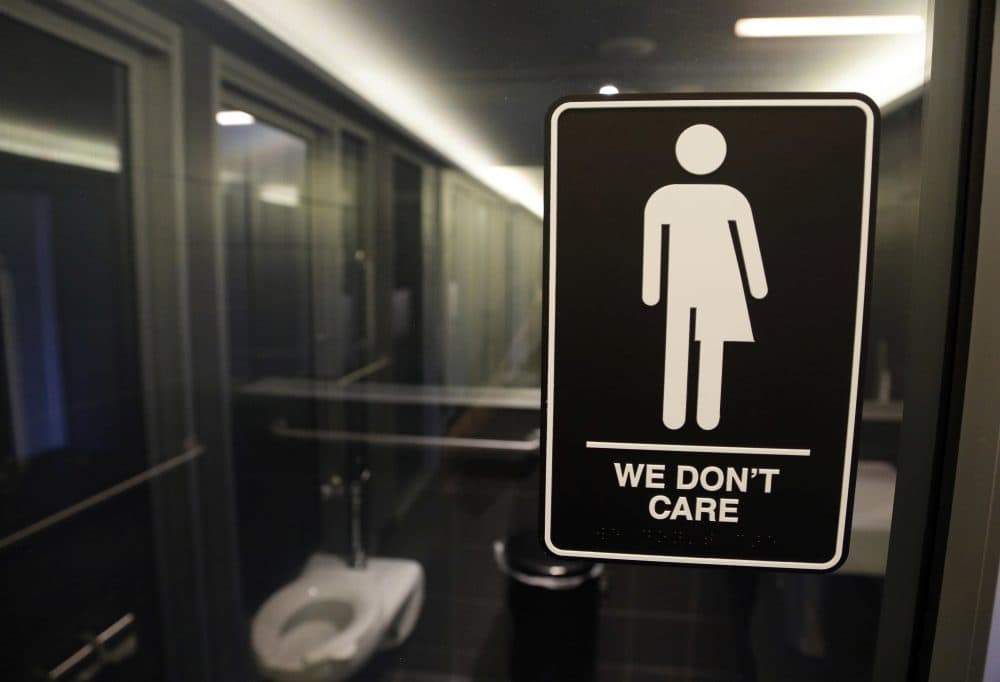Advertisement
Commentary
From 'She' To 'They:' A Mother's Plea To Keep Our Transgender Law

In May 2013, capping off 13 years at Cambridge public schools, my daughter (we still said “daughter” back then), Sula, strutted onto the stage at Cambridge Rindge and Latin School wearing a purple hoodie, surrounded by the a cappella group she (we still said “she”) had founded and led. With a well-orchestrated preamble of whistles and whoops, Sula launched into Justin Bieber’s “Boyfriend,” wooing the audience with a husky “If I was your boyfriend . . . “
The crowd roared in recognition, but quickly hushed to relish the display of clever gender-bending and sheer musical talent. This 17-year-old was self-confident, owning publicly her sexual orientation and evolving gender identity. Although Cambridge can be smug about its progressive ethos, the community had lived up to its self-image, and its standing ovation enveloped Sula in warm, open-minded support.
Four years later, Sula graduated from college, where “she” had become “they,” now clearly identifying as nonbinary — that is, at neither the feminine nor the masculine end of the gender spectrum. (Though Sula finds it true to their story to be called “she” in the past tense, the experience of many transgender and nonbinary people makes the use of discarded pronouns wrong for them.) Sula moved to a new city, a tad too far from Massachusetts for my taste. Especially since the 2016 election had stirred up hatred and violence nationwide, I worried about their life in less-enlightened locales.
Disturbingly ... this November our state could take a leap backward.
Here in Massachusetts, discrimination based on gender identity in housing, employment, credit and post-secondary education has been officially prohibited since 2011, and in 2016 protections were expanded to public places such as hotels, restaurants and stores. Disturbingly, however, this November our state could take a leap backward. Perhaps emboldened by the national swerve toward open bigotry, a group deceptively calling itself “Keep MA Safe” — peddling the lie that transgender people are the threatening ones rather than those who are too often threatened — is sponsoring a referendum aimed at repealing our 2016 law.
As in other states, much of the buzz revolves around bathrooms: They’re the only gender-specific portions of most public places, so discrimination based on gender identity tends to come to a head, so to speak, in their public-private realm. But the stakes are much higher than the term “bathroom bills” implies: Keeping people from comfortably using public toilets effectively excludes them from many aspects of public life.
Sula is no stranger to the discomfort of the “comfort station.” Having triggered unpleasant reactions by using women’s restrooms in southern states during singing-group tours in college, they dreaded repeating those experiences. Women entered the restroom, stared at them, and walked out. Despite all the feminine-looking people in line, a woman fixated on Sula and asked, “Is this the men’s room?” Some women flat-out told them to leave. A stranger advised that Sula “do something about” their appearance lest they be mistaken for a man. So when they wound up, after a sudden breakup, driving eight hours back to Cambridge one day, Sula pulled into rest stops whenever the grief overwhelmed them, but hesitated to use the bathroom.
Vote yes to assert our advance along the arc of justice.
Waiting at home, I felt helpless and angry. Why should Sula have to worry not just about driving hundreds of miles alone and bereft, but simultaneously about seeking simple human comforts like washing away their tears and — to be blunt — peeing when they had to pee? Of course, it could have been far worse: Many transgender kids refrain from peeing every school day, and glares and insults are not physical violence. But it should have been better. What did it matter to these strangers whether Sula adhered to their notions of gender?
Back in Boston a few months later, Sula visited a children’s music class to check out a teacher-training program at Berklee College. One child asked them, “Are you a boy or a girl?” Sula replied, “I’m a person.” After further questioning, Sula asked him: “What about you?” He thought for a moment and said, “I’m a person, too!” Maybe I shouldn’t credit Massachusetts for his adaptability — many young children haven’t yet cemented everyone into categories. But the story warmed my heart. Stereotypes and biases are often instilled in children by parents and teachers, but I like to believe that in Massachusetts, many adults work purposefully to raise open-minded, welcoming citizens. Which is why I find it so upsetting that Massachusetts voters could soon decide to make our state a more hateful place.
Hundreds of organizations are opposing repeal, so I hope they’ll work to clarify a potentially confusing aspect of the ballot question: Because it’s a “veto referendum,” a “no” vote means “repeal the existing law,” whereas a “yes” vote means “don’t repeal it.” But if you think of "yes" as an affirmation of equal rights for all, it should be easier to remember how to advance our state’s tradition of embracing the variety of human experience. Vote yes to celebrate both our differences and our unity. Vote yes to expand our understanding. Vote yes to assert our advance along the arc of justice. And, if nothing else, vote yes to let all people pee when they need to pee.
